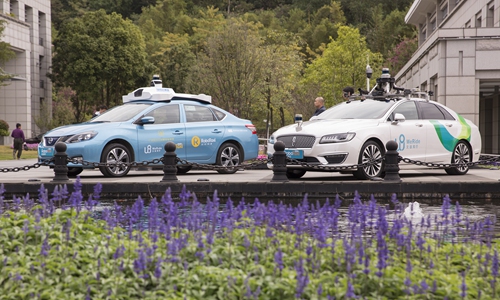HOME >> SOURCE
Changsha test rides offer glimpse into driverless future
By Xinhua - Global Times Source:Xinhua-Global Times Published: 2019/12/5 22:13:40
Pilot zones for self-driving technologies in place

Self-driving taxis in Guangzhou, South China's Guangdong Province Photo: VCG
Dodging jaywalkers, changing lanes to overtake other drivers and maintaining a safe trailing distance - these are basic skills which one must master before receiving a driver's license.
Now imagine all these maneuvers could be performed independently by a robot taxi on a busy, and sometimes congested, Chinese road.
In a bustling city block in Changsha, capital of Central China's Hunan Province, a fleet of white electric cars are proving this self-driving dream a reality, navigating busy traffic flows and attracting awe from photo-taking passersby.
Co-produced by Chinese search provider and artificial intelligence (AI) heavyweight Baidu and Chinese carmaker FAW Hongqi, 45 Robotaxis have begun test runs on 135 kilometers of city roads since receiving approval from the Changsha government on September 26.
Test rides in these robotic vehicles have offered a glimpse into the tantalizing future of smart, driverless traffic systems, which experts say are more effective and less prone to accidents.
Robotaxis do not look much different to ordinary SUVs on the outside, other than the cameras and radar lasers on their roofs.
A 5-kilometer drive on real roads around the Meixi Lake International Culture & Arts Center began after reporters tapped a screen to select a destination. The screen later displayed road conditions near the car, including the movements of other cars and pedestrians.
The car performed a series of near-flawless maneuvers, from turning around to decelerating as a jaywalker crossed the street. In an example of a real-life incident, there was a rear-end collision in front of a Robotaxi. It slowed down immediately, bypassing the accident at a safe distance.
The driver's seat is not exactly empty, but occupied by "safety personnel." Hu Bibo, one such "driver" with 10 years of driving experience, said he now has "limited functions."
With the throttle, brake, steering wheel and gear lever all managed by computers, Hu had the ability to move his hands and look around during the test drive. "My main task is to deal with any unpredictable situations that the car may encounter," he said.
Local green light
Changsha is among a number of Chinese domestic cities actively exploring self-driving technologies with open-road trials.
It is home to the National Intelligent Networked Automobile (Changsha) Test Zone, which, since its establishment last year, has expanded its driverless trials from closed roads to open city roads.
Thus far, the zone has hosted over 1,800 tests of automatic vehicles from 38 companies, with a testing mileage of more than 60,000 kilometers. Industry heavyweights like Baidu, Alibaba, Tencent and JD.com have all tested their vehicles or key systems there.
To facilitate the test runs, smart facilities including high-definition cameras and smart sentry boxes have also been installed at 38 intersections on the test roads to provide more information for robotic drivers to make wise decisions, according to the city's traffic police.
A spokesperson with the Xiangjiang Smart Tech Innovation Center, which operates the test zone, said Changsha has been a testing ground for several categories of smart vehicles, including self-driving buses running on China's first open-road smart bus demonstration line and unmanned vans delivering packages for e-commerce giant JD.com.
Other cities including Beijing and Guangzhou are also hosting pilot zones for self-driving technologies. In November, a fleet of 30 self-driving vehicles started carrying passengers in the economic development zone of Cangzhou, North China's Hebei Province, in the first pilot program to cover an entire city district.
According to the Autonomous Vehicle Disengagement Reports 2018 issued by the California Department of Motor Vehicles, China's Baidu and Pony.ai were among the top 10 in terms of most miles driven and least number of "disengagement events," which refer to instances when a human overrides the self-driving system to manually operate the vehicle.
Zhu Lei, an expert on self-driving technologies with the Beijing Institute of Graphic Communication, said self-driving technologies are mellowing and being put into road tests in countries like China and the US. A vast data pool, heavy industrial investment, strong core technologies and a favorable development environment are China's advantages in this field.
Posted in: INDUSTRIES,COMPANIES